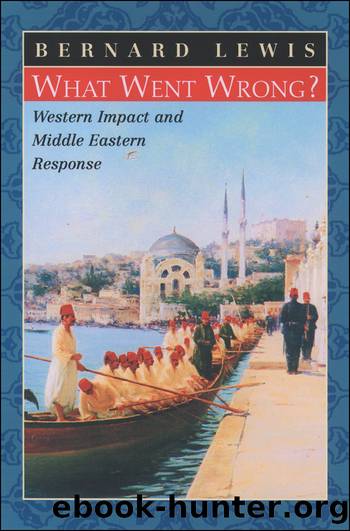What Went Wrong? by Lewis; Lewis Bernard;

Author:Lewis; Lewis, Bernard;
Language: eng
Format: epub
Publisher: Oxford University Press USA - OSO
Published: 2002-11-14T16:00:00+00:00
5
Secularism and the Civil Society
Secularism in the modern political meaning*âthe idea that religion and political authority, church and state are different, and can or should be separatedâis, in a profound sense, Christian. Its origins may be traced in the teachings of Christ, confirmed by the experience of the first Christians; its later development was shaped and, in a sense, imposed by the subsequent history of Christendom. The persecutions endured by the early church made it clear that a separation between the two was possible; the persecutions inflicted by later churches persuaded many Christians that such a separation was necessary.
The older religions of mankind were all related toâwere in a sense a part ofâauthority, whether of the tribe, the city, or the king. The cult provided a visible symbol of group identity and loyalty; the faith provided sanction for the ruler and his laws. Something of this pre-Christian function of religion survives, or reappears, in Christendom, where from time to time priests exercised temporal power, and kings claimed divine right even over the church. But these were aberrations from Christian norms, seen and reciprocally denounced as such by royal and clerical spokesmen. The authoritative Christian text on these matters is the famous passage in Matthew 22:21, in which Christ is quoted as saying, âRender therefore unto Caesar the things which are Caesarâs; and unto God the things that are Godâs.â Commentators have differed as to the precise meaning and intention of this phrase, but for most of Christian history it has been understood as authorizing the separate coexistence of two authorities, the one charged with matters of religion, the other with what we would nowadays call politics.
In this, the practice of Christianity was in marked contrast with both its precursors and its competitors. In imperial Rome Caesar was God, reasserting a doctrine that goes back to the god-kings of remote antiquity. Among the Jews, for whose beliefs Josephus coined the term âtheocracy,â1 God was Caesar. For the Muslims, too, God was the supreme sovereign, and the caliph was his vice-gerent, âhis shadow on earth.â Only in Christendom did God and Caesar coexist in the state, albeit with considerable development, variety, and sometimes conflict in the relations between them.
The early Christian experience of defying or avoiding authority was not without precedents. The Jews had offered numerous examples of a religion surviving the persecution of a hostile sovereigntyâof perseverance as sojourners in the alien land of Egypt, of prophetic protest against their own erring kings, and, in the struggle of the Maccabees, of resistance to foreignâand paganâconquest and domination. In Persia, Zoroaster initiated a religious and moral change, which in time took over the state. Still further away, in India, the mission of the Buddha and the subsequent work of his missionaries first brought the idea of a universal religion with a message to all mankind. Even pagan Rome offers examples of religiously inspired or religiously expressed opposition to the Roman state, both from independent peoples resisting Roman conquest, and from provincial subjects resisting Roman rule.
Download
This site does not store any files on its server. We only index and link to content provided by other sites. Please contact the content providers to delete copyright contents if any and email us, we'll remove relevant links or contents immediately.
The Light of Days by Judy Batalion(828)
The Crime Book by DK(703)
Chasing the Thrill by Daniel Barbarisi(656)
1312, Among the Ultras by James Montague(585)
The Doctor Who Fooled the World by Brian Deer(565)
Till Murder Do Us Part by James Patterson(559)
E.R. Nurses by James Patterson(559)
Invention by James Dyson(558)
The Complete Correspondence 1928-1940 by Theodor W. Adorno & Walter Benjamin(505)
Climb by Susan Spann(489)
Mind Games by Neville Southall(478)
The Dream Architects by David Polfeldt(475)
The Reporter by Mark Paul Smith(475)
Space 2069 by David Whitehouse(474)
Surely you Ìre joking, Mr Feynman by Richard Feynman(458)
If You Should Fail by Joe Moran(441)
Masterful Marks: Cartoonists Who Changed the World by Monte Beauchamp(431)
The 'Wolfman' by Sigmund Freud & Sigmund Freud(428)
Banking and Beyond by Unknown(422)
